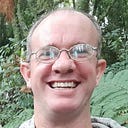Zen and the art of Transformation
Or, how I learnt to stop worrying and love the end of the way things currently are
It’s not very hard, when one casts their gaze around the world, to see how the situation seems challenging. Humanity seems to be a runaway train, a rampantly overconsuming species, the Future Eaters. Climate change, biodiversity loss, coral reef bleaching, extreme weather events, increasing food scarcity, and so on. And I’m not someone who is likely to stick my head in the sand, I can see what’s going on and where it’s heading. But recently I found a way to transcend the anxiety and truly enjoy every moment. The moments may get more and more challenging in a decade or two, but that’s ok.
I’ve always thought about death. My brother died when I was 3, and I said to my mum “Mark went away mum, will I go away?”. When I was a teenager we discovered mum had cancer. We went on a big overseas trip for months, but every now and again I’d get this freefall panic sensation as I thought about my consciousness just becoming nothing, no thoughts, no sensations, not anything, the standard atheist existential dread. In my twenties I was drawn to Buddhism and started practicing meditation. After more than 20 years of practice, with big gaps after my son was born, I find that practice ripening. I can feel how everything is one thing, no matter how it transforms.
I love how Thich Nhat Hanh, my favourite Zen teacher, talks about death. Thay is an amazing person, he practiced and led others to practice through the Vietnam war, and after he was exiled, set up the Plum Village tradition which has become a global community and network of practice centres. He invented Engaged Buddhism, which is about making sure we are actively, practically engaged in reducing suffering in the real world, and practicing in action, not just sitting on the meditation cushion all the time. And I’ve never found anyone who can express Buddhist wisdom so eloquently or in a way so easy to apply (check out Practicing with Difficult Emotions which is amazing). I love how he talks about death, with the simple analogy that a cloud never dies, check it out.
Nothing can’t become something. And something can’t become nothing. Causes always have effects. Buddhists hold this to be true for consciousness as well as matter. Many cultures have reincarnation traditions. And a growing number of Western Researchers are developing an empirical evidence base for after death experiences and reincarnation. Researchers are also exploring how consciousness may arise from Quantum Entanglement. This intuitively makes sense to me, as I was never satisfied with the idea that our brains operated in a classical physics way. The emergent properties of our consciousness, complex emotions, creativity, ambiguity, and so on, arising from a wet bag of neurons just never seemed to add up. If consciousness arises through Quantum processes, this to me feels like it throws the door wide open. I’ve noticed how explanations of quantum processes, for example the double slit experiment, where an electron is in two places at once and interferes with itself until we observe it, and then it becomes fixed, seem quite mystical and counterintuitive in nature. Almost like science is returning to the realm of spirit and mysticism.
Quantum physics tell us also that linear time is an illusion, and that the past, present and the future are all present now, we just don’t have the ability to perceive it. My intuition tells me that consciousness is eternal, which is intellectually the coinflip, and just as hard to comprehend, as the atheist concept of death being total annihilation; moment, after moment, after moment, infinitely continuing. But if there are an infinity of moments to come, it seems like we’d better get used to moments. Back to Thich Nhat Hanh. “Waking up this morning, I smile. Twenty-four brand new hours are before me. I vow to live fully in each moment and to look at all beings with eyes of compassion.” which seems pretty straight forward. But the thing about Thay is, he doesn’t make empty vows (sorry I still talk about him in present tense even though he passed away, he is just so present for me). What would it be like to be present and live fully in each moment, in an infinite sequence of moments?
Which brings us back to our current predicament. If the death of the way things are, rampant consumerism, environmental systems collapse, societal instability, are what’s to come, can we be with all of this, in the knowledge that consciousness is eternal, and the task is to keep living fully in the moment? Would I like my son to have a long life? Yes of course. Would I like his son to have a son, and so on? Indubitably. But on the other hand, each day of my life, and even more so my son’s life, seems miraculous to me. And there is something special about this moment for all of its strife. More and more people seem to be becoming conscious, aware, mindful, more awake, more connected. Cities are hybridising hundreds of cultures. Inclusive Cocreation is emerging as a practice with the potential to create interwoven, socially cohesive, communities of interbeing. Everything that is happening has a reason to happen, it has causes and conditions. It has intrinsic value. What is the essence of this moment? What is emerging? Let us see!
